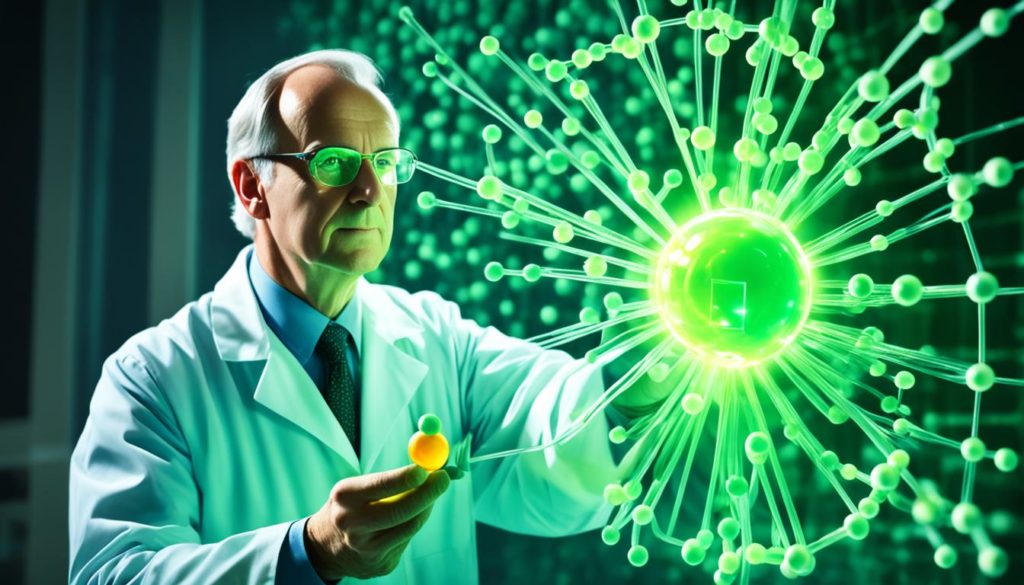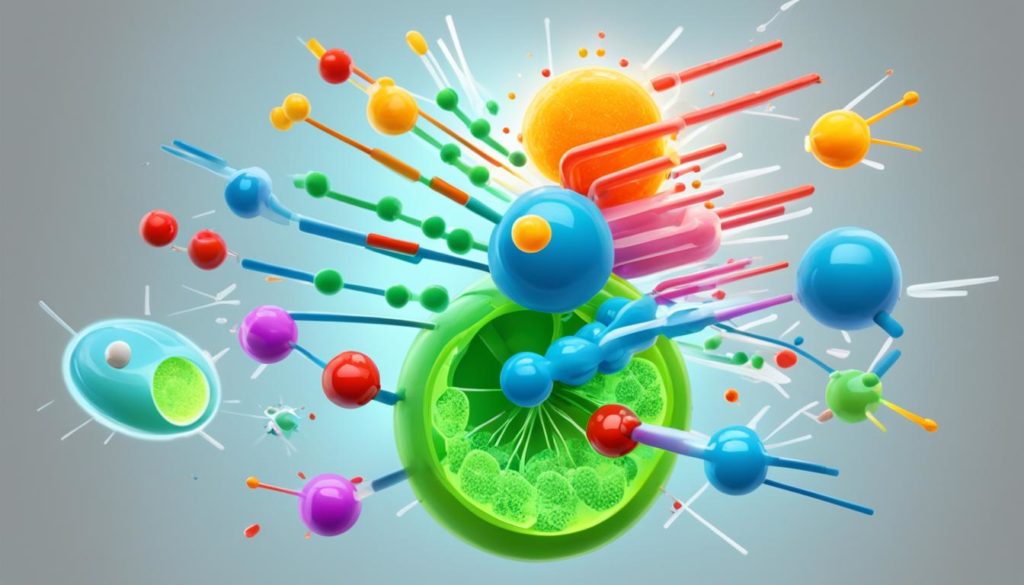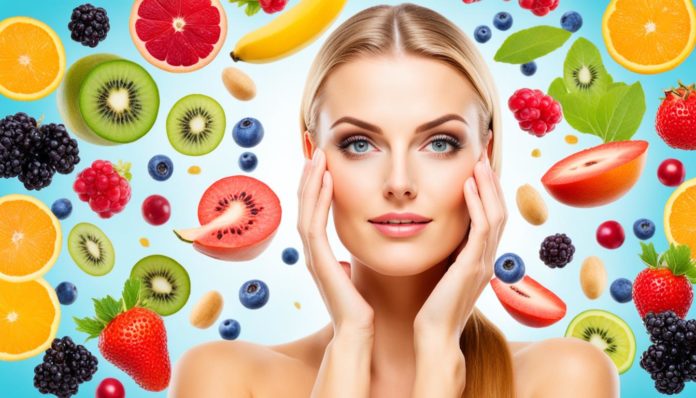Vitamin B2, also known as riboflavin, is vital for our health and well-being. It helps with many important body functions. These functions are key to staying healthy and full of energy.
It’s important to know how Vitamin B2 helps us live a healthy life. This guide will explore its many roles and how it affects our nutrition and health.
Key Takeaways
- Vitamin B2 is essential for many body functions, especially energy production.
- Riboflavin keeps cells healthy and helps make energy.
- This nutrient is part of the Vitamin B complex, important for overall health.
- Not having enough Vitamin B2 can cause health problems and symptoms.
- Keeping enough riboflavin is crucial for staying healthy and full of energy.
What is Vitamin B2 (Riboflavin)?
Vitamin B2, also known as riboflavin, is an essential vitamin for good health. It helps the body produce energy and supports cell growth. It’s also key for the health and function of cells.
Definition and Basic Facts
Riboflavin is a yellow-orange substance that belongs to the B-vitamin group. It’s important for many body processes. It turns into coenzymes that help with redox reactions. Since our bodies can’t make these vitamins, we need to get them from food.

History of Riboflavin
The Vitamin B2 discovery started in the early 1900s. Scientists found riboflavin while looking into nutrients that prevent ariboflavinosis. Over time, its importance in health became clear, making it a key vitamin.
Here are some key facts about vitamin B2:
- Water-soluble and stable when heated
- Can break down with light exposure
- Found in milk, eggs, green veggies, and fortified cereals
This info sets the stage for exploring riboflavin’s many roles in health.
The Role of Vitamin B2 in Energy Metabolism
Vitamin B2, also known as riboflavin, is key to our body’s energy production. It’s vital for turning food into energy. This nutrient is crucial for our cells to work right.
How Riboflavin Facilitates Energy Production
Riboflavin is a key coenzyme in energy-making reactions. It’s part of FAD and FMN coenzymes. These help change carbs, fats, and proteins into ATP, our main energy source.

Impact on Cellular Metabolism
Vitamin B2 does more than just help make energy. It’s also key for how our cells work. It’s needed for making ATP from oxygen and glucose in oxidative phosphorylation.
This process keeps our energy levels right and supports cell growth and DNA repair. Studies show that enough riboflavin is good for our metabolism and health.
For more on how nutrition affects your health, check out this article.
| Nutrient | Function | Benefit |
|---|---|---|
| Riboflavin (Vitamin B2) | Energy production, cellular metabolism | Increased ATP generation, enhanced metabolic functions |
| FAD & FMN Coenzymes | Act as coenzymes in redox reactions | Support in converting food into energy |
Health Benefits of Vitamin B2
Riboflavin, also known as Vitamin B2, is a key nutrient for our bodies. It offers many riboflavin health benefits. These benefits include its strong antioxidant effects and its role in growth, development, and overall health.
Antioxidant Properties
One of the top riboflavin health benefits is its antioxidant effects. Antioxidants fight off harmful free radicals in our bodies. This reduces oxidative stress and protects cells from damage. Eating riboflavin helps shield our cells and tissues from oxidative stress. This supports our overall health and helps us live longer.
Promoting Growth and Development
Riboflavin is vital for growth and development, especially in kids and teens. It helps turn fats, proteins, and carbs into energy and supports growth. Having enough riboflavin is key for healthy growth and development during these important years.
Supporting Red Blood Cell Formation
Riboflavin is crucial for making red blood cells. Eating enough riboflavin can prevent anemia by helping the body make red blood cells well. This is important for keeping oxygen levels in the blood healthy. It ensures that tissues get enough oxygen for proper function and energy.
Maintaining Healthy Skin
Vitamin B2 also boosts skin health. It helps repair skin tissues, supports sebum glands, and prevents skin problems like dermatitis. Eating foods rich in riboflavin can help keep your skin looking healthy.
The many riboflavin health benefits show its importance. From antioxidant effects to supporting growth, making red blood cells, and skin health, it’s a vital vitamin. Adding foods high in riboflavin to your diet or taking supplements can offer these big health benefits. This can help with overall well-being and anemia prevention.
Recommended Daily Intake of Riboflavin
The Recommended Daily Allowance (RDA) for Riboflavin is key to getting enough vitamins daily. Following nutritional guidelines helps people get the right amount for good health. The amount needed changes with age, sex, and life stage. Here’s a breakdown based on official dietary advice.
| Demographic | Riboflavin RDA (mg/day) |
|---|---|
| Infants (0-6 months) | 0.3 |
| Infants (7-12 months) | 0.4 |
| Children (1-3 years) | 0.5 |
| Children (4-8 years) | 0.6 |
| Children (9-13 years) | 0.9 |
| Adolescents (14-18 years, Male) | 1.3 |
| Adolescents (14-18 years, Female) | 1.0 |
| Adults (19+ years, Male) | 1.3 |
| Adults (19+ years, Female) | 1.1 |
| Pregnant Women | 1.4 |
| Breastfeeding Women | 1.6 |
Knowing the Riboflavin RDA helps people adjust their vitamin intake for their needs. These guidelines are key to avoiding shortages and keeping everyone healthy.
Vitamin B2 Deficiency: Symptoms and Risks
Riboflavin, also known as Vitamin B2, is crucial for our bodies. But not having enough of it can cause health issues. Knowing the signs and risks of not getting enough riboflavin can help prevent problems.
Early Signs of Deficiency
Feeling tired, having a sore throat, and red eyes are early signs of not getting enough riboflavin. You might also see your tongue swelling and cracking, or cracks at the mouth corners. These signs are often small but catching them early can stop bigger issues.
Long-term Health Implications
Not getting enough riboflavin can lead to bigger health problems. These include vision issues like cataracts and skin problems like seborrheic dermatitis. It can also make anemia worse, causing more weakness and other vitamin shortages.
It’s important to watch your diet for these nutrients and know the risks. This includes issues like poor nutrient absorption and chronic alcohol use. You can learn more about nutrients and how they work together here.
Knowing the signs and risks of vitamin shortages is key to staying healthy. Regular health checks and eating well can help avoid these problems.
Dietary Sources of Riboflavin
Riboflavin, also known as vitamin B2, is key for a balanced diet. Knowing the best foods for riboflavin helps you get enough of this important nutrient. Adding these foods to your meals boosts your vitamin intake and supports your body.
“Eating a well-rounded diet with riboflavin-rich foods can significantly enhance overall health and prevent deficiency-related issues.”
Meat and dairy are top sources of riboflavin. Milk, cheese, and yogurt are great for getting your daily dose. Eggs, lean meats like steak and liver, and fish like salmon and trout also pack a lot of this nutrient.
For plant-based diets, many vegetables and fortified cereals are good sources. Spinach, kale, almonds, and mushrooms are great choices. Whole grains and enriched bread also add to a balanced diet.
| Food | Typical Serving Size | Riboflavin Content (mg) |
|---|---|---|
| Milk (2% fat) | 1 cup | 0.34 |
| Yogurt (plain) | 1 cup | 0.57 |
| Eggs | 1 large | 0.27 |
| Almonds | 1 ounce | 0.29 |
| Spinach (cooked) | 1/2 cup | 0.21 |
Having a mix of riboflavin foods in your meals makes your diet rich in vitamins. Whether you prefer animal or plant-based foods, there are plenty of options for a balanced diet.
Supplements: When and How to Use Them
Sometimes, our diets don’t give us enough riboflavin. That’s when Riboflavin supplements can help. They make sure we get enough vitamin B2. But, it’s key to know the options and talk to a doctor before starting supplements.
Over-the-Counter Options
There are many Riboflavin supplements you can buy without a prescription. You can find them at pharmacies and health stores. Here are some common types:
- Tablets: Easy to take and come in different strengths.
- Capsules: Good for those who need more riboflavin in a small package.
- Powdered forms: Great for mixing with drinks or food, perfect for those who have trouble swallowing pills.
Here’s a table that shows the different forms of riboflavin supplements and how much you might need:
| Form | Typical Dosage | Advantages |
|---|---|---|
| Tablets | 100-400 mg | Easy to use, widely available |
| Capsules | 50-300 mg | Higher concentrations, easy to swallow |
| Powder | 200-600 mg | Versatile, mixable with food/drink |
Consulting Healthcare Providers
Even though supplements are easy to get, talking to a doctor first is a must. They can look at your health and what medicines you’re on. This helps avoid any bad reactions with Riboflavin supplements. A doctor will also tell you the right amount and how long to take it for.
Interactions with Other Nutrients
It’s important to know how Vitamin B2 works with other nutrients for the best benefits. Riboflavin is key for energy and health. Its effectiveness can change based on nutrient absorption and how it interacts with other vitamins.
This section looks at how certain foods can help or hurt riboflavin’s work.
Absorption and Efficacy
What you eat can change how well your body absorbs riboflavin. Some foods, like those high in certain fibers, can slow down Vitamin B2 absorption. This means it might not work as well.
But, eating foods with niacin can help your body take in more riboflavin. Knowing these facts can help you plan your meals better.
Synergistic Vitamins and Minerals
Riboflavin works well with other vitamins and minerals. For example, eating foods with Vitamin B6 and folic acid can make red blood cells work better. Minerals like magnesium also help riboflavin do its job.
Understanding these food combinations can help you make a balanced diet. For more info, check out Mount Sinai’s health library.
FAQ
What is Vitamin B2 (Riboflavin)?
Vitamin B2, also known as riboflavin, is a key vitamin that helps with energy, growth, and making red blood cells. It also protects cells from damage by acting as an antioxidant.
How does riboflavin contribute to energy production?
Riboflavin helps make energy by working as a coenzyme in energy-making pathways. It’s crucial for flavoproteins, which help with cellular energy use.
What are the antioxidant properties of Vitamin B2?
Vitamin B2’s antioxidants neutralize free radicals in the body. This reduces oxidative stress and protects cells from damage. This can improve health and lower the risk of chronic diseases.
Why is riboflavin important for growth and development?
Riboflavin is key for growth and development by supporting cell function and making new cells. It’s very important during fast growth periods, like in kids and teens.
How does Vitamin B2 support red blood cell formation?
Vitamin B2 helps make red blood cells by improving iron absorption and making hemoglobin. Hemoglobin is key for carrying oxygen in the body.
What are the recommended daily intakes of riboflavin?
Daily riboflavin needs vary by age, sex, and life stage. Most adults need about 1.3 mg for men and 1.1 mg for women. Check national dietary guidelines for specific amounts.
What are the symptoms of riboflavin deficiency?
Signs of not getting enough riboflavin include a sore throat, mouth and throat redness, and swelling. You might also see cracks or sores on your lips and skin inflammation.
Which foods are rich in Vitamin B2?
Foods high in Vitamin B2 include dairy, meats, eggs, leafy greens, nuts, and enriched cereals. Eating these can help you get enough riboflavin.
When should one consider taking riboflavin supplements?
You might need riboflavin supplements if you’re lacking it, have conditions that affect nutrient absorption, or need more (like pregnant women). Always talk to a healthcare provider before starting supplements.
How does riboflavin interact with other nutrients?
Riboflavin works with other B vitamins to improve their effects. Minerals like zinc and iron can affect how well it’s absorbed. A balanced diet of vitamins and minerals can make nutrient use more efficient.


